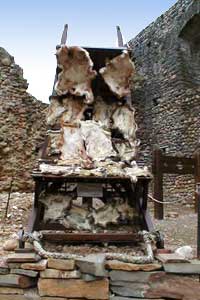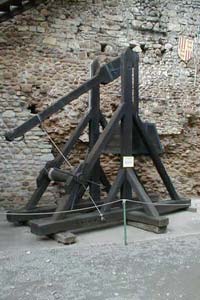

Ariège |
Gers |
Hautes Pyrénées |
Lot |
Tarn |
Other regions & other castles |
Previous months’ selections |
| Mauvezin Castle |
|
|
These ramparts, moreover, were quite useful to discourage the aggressions of the Count de Comminges who tried, by félonie, to benefit from the crusades of Centule. In 1213, the defeat of the armies of king d' Aragon and his vassal of the counties and occitans with Muret against the sanguinary hordes of Simon de Monfort, deprived Bigorre of the protection of these kings de Barcelone. That was going to allow, by low operations, with King d' Angleterre to seize episodically this castle in 1255, 1259 and 1284. The kings of France, by such unfair processes, since 1292, dispossessed the family of our Count Jean of Bigorre and the castle of Mauvezin. During this century, as in more the share of the "casteths naus of Gasconha", the French castelnaus; the peasants gathered around the Castle where they found protection. In the year 1361, the castles of Bigorre were again given to king d' Angleterre following the defeat of the French Army in Poitiers (treated of Brétigny). Jean Froissard, the large chronicler of this one hundred year old war, told the seat of the castle, in 1373, by the army of the Duke of Anjou, brother of the king; I for my part, never intended to say that the resistance of the castle was also long, but all those which could attend this event returned the heart today. In this time there, Gaston Fébus, sovereign Viscount of Béarn and Count de Foix made an effort, by all the means, to recover the Castle of Mauvezin and Bigorre whose its family had been wrongfully despoiled in 1292. This extraordinary prince, incontestably more refined of his time, radiated with Spain in Prussia. No one did not deserve its nickname of Fébus better, the Count sun. By the force or the money, it managed to connect its grounds of Foix to those of Béarn. Thus in 1379, it obtained finally Mauvezin, link essential to its great Pyrenean Principality. It quickly built this colossal keep 37 meters height and 3 meters base width. Thus, by its impressive dimensions and its site, it constituted a protective shield against the machines of war which one could have introduced into the suburb, while protecting the entry effectively. Lastly, Gaston Fébus made raise the ramparts and crowned all the fortress of machicolation because large was its richness.
Its successors, always main from this castle, were going to become kings. Kings de Navarre initially, with always the hope to constitute this large kingdom on both sides of the Pyrenees, dreams cherished by Gaston Fébus... Vain hope, choked by these too powerful neighbors of France and Spain. Kings de France finally with that which deserved well these qualifiers of HENRI IV large or that more known, of good king Henri, "lo noste Enric", per tots Gascons. Indeed, only managed to him to put an end to this terrible tragedy that were the wars of religion for France, but more still for our area, during the last third of this XVIe century. During this black period, the castle was with the hands of a Protestant garrison which plundered the surrounding cities before falling to the hands from the catholics who used the primitive keep as prison. In 1607, Bigorre and the castle were attached to the kingdom of France. Then this fortress, stripped slowly its stones, especially during the revolution declined. Then our language occitane declined which, however, resounded in these walls during one millenium. Spoken about the Valley of Spanish Aran to the Italian alpine valleys and about the Auvergne-Limousin in the Mediterranean, it was the most brilliant language of the Romance Middle Ages... At the beginning of the century, a man, Albin Bibal, and an association "EscÒle Gaston Febus" made it possible to believe in a revival of the castle and language, spoken by all the population about Gascogne and Occitanie. Bibal with its expenses, restored the castle in order to make it worth visiting, thus saving it unquestionable death. It yielded it to the association which has the role to promote the language and the literature occitane as well as the inheritance of Gascogne."L' EscÒla achieved a work of considerable edition old and modern occitans authors during this century. Since ten years, it invested very significant sums, taking into account its modest means, in the restoration of this castle and it endeavours to continue this rehabilitation thanks to the contests of many voluntary. The state took into account the value of its work by recognizing it of public utility. "Viscan a long time aqueth castèth e' ruffle lenga nosta!" What lives a long time this castle and this language which are expensive to us!. |
|
Castle of the month : |
Search |
For any question concerning this Web site, send a message to webmaster

 Centule
the cross one, one of the largest knights of the Christendom, which
raised these walls with the money of its seigniories of Aragon,
torn off in Sarazins, across the mountains.
Centule
the cross one, one of the largest knights of the Christendom, which
raised these walls with the money of its seigniories of Aragon,
torn off in Sarazins, across the mountains.  And
this large lord, disappeared in his turn in 1391...
And
this large lord, disappeared in his turn in 1391... 
